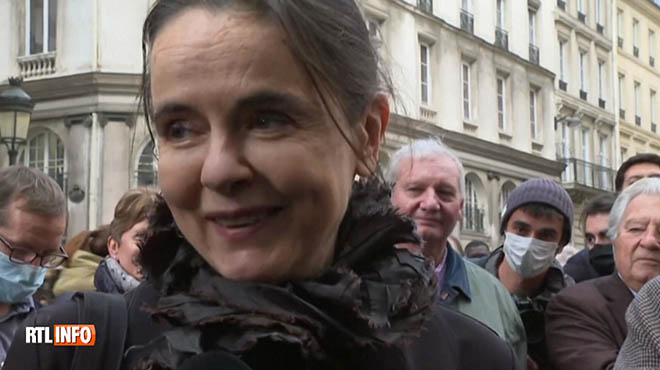Belgian Amélie Nothomb wins the Renaudot Prize
A young writer unknown to the general public and a sales star: the Senegalese Mohamed Mbougar Sarr won the Goncourt on Wednesday, with “The most secret memory of men”, and the Belgian Amélie Nothomb the Renaudot prize for “First blood”.
Writer Amélie Nothomb won the Renaudot Prize on Wednesday for her last Roman “First Blood”. Coming from a well-known Belgian aristocratic family, the novelist Amélie Nothomb was born, fictitiously, on August 13, 1967 in Kobe, Japan, or according to Belgian notarial records, on July 9, 1966 in Etterbeek.
Fabienne Claire Nothomb of her real name is the daughter of Patrick Nothomb, Belgian diplomat. She is also the great-niece of Minister of State Charles-Ferdinand Nothomb. Shortly after his birth, his diplomat father left to represent Belgium in Japan, in Osaka. Amélie Nothomb spent most of her childhood and adolescence in Asia, from China to Bangladesh via Laos and Burma.
Japanese culture marks it deeply, inspiring in particular one of its greatest successes: “Stupeur et tremblements”. She calls her early years “happy childhood” before a harsher adolescence brought on by sexual assault and years of anorexia.
An iron discipline to indulge in your art
At the age of 17, she returned to Brussels to finish her secondary studies and to follow a university training in Roman philology at the ULB, strongly inspired by her lectures by Nietzsche, which she says saved her life.
It was also at this age that she began to write, never to stop. Because Amélie Nothomb is one of the most prolific authors and authors that the French language is known. Since her first novel released in 1992, when she was 25 years old, “Hygiène de l’Assassin”, the writer has published one per year, for the start of the literary school year.
She says to have written more than double of them, dozens of manuscripts not having been published, the woman of letters judging them “too intimate”. She binds herself to an iron discipline to devote herself to her art, which she exercises “by hand, on school notebooks and without nature”. “I wake up every day at 4 am, since 1989.
She writes from 4 to 8 in the morning
Even the day after cooking, even when I’m sick, even when I have serious problems “, she tells the Express.” The state of mind that we catch at this hour- there of the day, that is to say when one wakes up too early, is absolutely unique. “She writes from 4 to 8 o’clock in the morning, often helped by half a liter of tea” much too strong and perfectly disgusting”.
Her daily routine also brings her to the office she occupies with her lifelong editor, Albin Michel, where she has made a point of responding to the multitudes of letters she receives from her readers. Living without a cell phone and without a computer, these letter-writing correspondences give him the feeling of “being connected in a different way”.
The ritual pays off as each novel is expected at the end of summer and is a big hit, although the quality isn’t always judged to be equal. Critical recognition was immediate, his first novel “Hygiène de l’Assassin” (1992) won the René-Fallet and Alain-Fournier prizes. “Le Sabotage d’amore” (1993) is responsible for the literary prizes of the Vocation and Jacques-Chardonne. “Les catilinaires” (1995) won the Jean-Giono Jury Prize.
First awards in the 90s
But the real consecration came at the end of the 90s with “Stupeur et tremblements”, a largely autobiographical novel inspired by his experience as a performer in Japan. He was crowned with the Grand Prix du roman de l’Académie française in 1999 and appeared in the preselection for the Goncourt, just like “Ni d’Eve ni d’Adam” (2007) which received the Flore prize before his career. whole is honored by the Jean-Giono Grand Prix the following year.
That year, she was also made Commander of the Order of the Crown, before being personally awarded the title of Baroness in 2015. A title that “made her giggle.” A year that also saw her, finally, become a member of the Royal Academy of French Language and Literature in Belgium.
It is chosen “by a large majority” for “the importance of the work, its originality and its coherence, its international influence”, in the words of the secretary of the academy, Jacques De Decker. The academy had already distinguished him in 1998 for his novel “Mercure”, which has the particularity of having two fins.
Her twenty-eighth novel, “Thirst”, which she says is “the book of her life” is published at the start of the literary school year 2019. The book, in which she puts herself in the skin of Jesus just before his crucifixion , immediately seduced crowds and critics. With 180,000 copies, it rose to the top of book sales. And after “Stupeur et tremblements” and “Ni d’Eve ni d’Adam”, his novel is also shortlisted for the Goncourt Prize, until the final square.
It is ultimately “All men do not inhabit the world in the same way” by Jean-Paul Dubois who wins. In 2020, she released “The aerostats”, then “First blood” in 2021, the fictitious memories of her father who died the previous year. He won the Renaudot Prize with six votes.



:focal(545x371.5:555x361.5):watermark(cloudfront-eu-central-1.images.arcpublishing.com/ipmgroup/UFVD77VYQZHRHBUO5OR7E7I6TY.png,0,-0,0,100)/cloudfront-eu-central-1.images.arcpublishing.com/ipmgroup/IMUON7UKXRG7PJ4TKOYT2U7AXM.jpg)